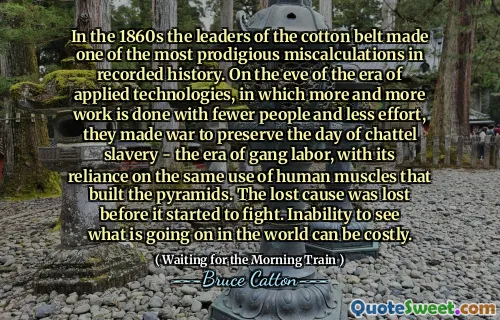
You were apt to go from one extreme to the other, in a truly pious environment; which is why ministers' sons in that day were more less expected to become loose livers when they grew up.
The quote reflects on the pressures faced by ministers' sons in a pious community. The expectations placed on them often led to a rebellion against their upbringing, resulting in a tendency to swing to the opposite extreme of their parents' strict values. This dynamic illustrates a common theme of how children react against the rigid expectations of their upbringing.
Bruce Catton's "Waiting for the Morning Train" examines this phenomenon, revealing how the intense moral climate of their upbringing can create a push toward a countercultural lifestyle. It underscores the irony that those who are raised with strict moral teachings often find themselves straying furthest when they reach adulthood.







